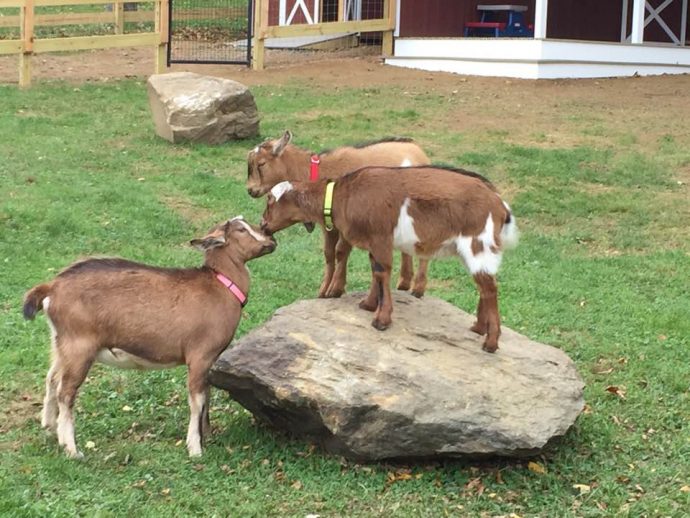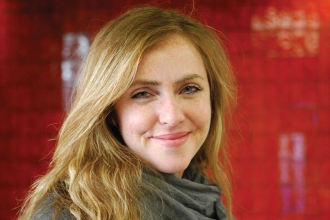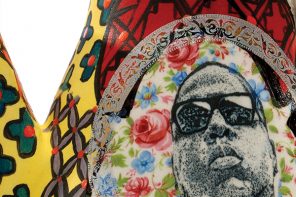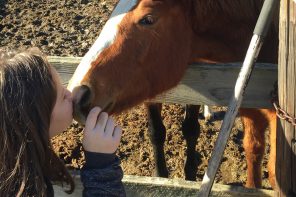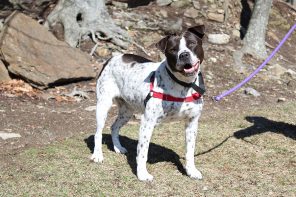At the Jennie Clarkson campus of St Christopher’s in Valhalla, you’ll be greeted with enthusiasm by Jennie and Clark.
Clark might press his soft cheek into your palm or lurch toward you with an affection that feels like a hug. If you allow it — and you might — he’ll gladly take it further with a kiss. Jennie will have overheard these shenanigans with her large ears and come running.
But don’t let this exuberant welcome intimidate you. Clark is a friendly Mini French Alpine goat and simply can’t help himself.
Jennie is a Toggenburg-Nubian cross, a breed of dairy goat with floppy ears and a nurturing personality. Then there’s Don and Ralph, two playful Pygmy Nigerian crossbreed twins who also want to say “hello.” In the chicken-coop next door are Red and Artemis. Artemis is a Crested Cream Legbar who lays beautiful blue eggs. She and Red, a Columbian Blacktail hen, will be happy you’re here and have loud things to say about it.

This motley animal family is the pioneer of an inspired Animal-Assisted Therapy program at St. Christopher’s Inc., a nonsectarian organization serving the needs of vulnerable children. It has three locations — a primary campus in Dobbs Ferry, an all-female campus in New Windsor, and 35 acres in Valhalla, perched high on a hill above the Kensico Reservoir, where the animals are having an effect.
“They are a great addition to our program here,” says Jerry DeJean, clinical director at the Jennie Clarkson campus. “Our kids are amazingly kind and sensitive. The animals bring that out.”
The Valhalla site is home to the REACH program. Its aim is to help young people with a wide spectrum of disabilities learn the necessary skills it takes to become independent, socially integrated adults. The campus includes residential cottages that sleep 54 youths between the ages of 13 and 21. Many residents are on the autism spectrum or have significant behavioral and mental challenges. During the day, they attend REACH Academy, a public high school in the Greenburgh-North Castle Union Free School District. Back on campus, there are clinical and therapeutic programs, including a 1-acre garden and, as of last October, the Jennie Clarkson barn.
The Animal-Assisted Therapy Program began with St. Christopher’s CEO Donald Antonecchia and staff attending the Westchester County 4-H Fair at the Alfred B. DelBello Muscoot Farm in Katonah. There they met AnnMarie Sasso, a consultant and member of the Animal Therapy Committee and visited her Croton-on-Hudson farm soon after.
“We were originally going to get two goats,” says Judith Halden, supervisor of the Animal-Assisted Therapy Program. But plans for two quickly turned to four. “AnnMarie’s goats were having such a good time together,” she adds.
Four goats and two chickens later and “we’re learning as we go,” Halden says with a smile that conveys she’s loving every minute of it.
Halden was wowed when Sasso taught the kids to make hand cream with their freezer full of goat milk. She realized they could continue to weave lessons into every aspect of animal care. “It opens up avenues of different fields to practice on and think about,” she says.

Sasso recalls using the milk to make butter with the students. One resident wasn’t interested in participating. But his peers were so enthusiastic, they got him involved. He not only joined in making the butter but he ate most of it.
Residents learn about adult animal husbandry and hoof trimming and give the animals monthly checks for lice and mites. Some have formed a 4-H club through Cornell Cooperative Extension. They bring the animals to weekend fairs where they present the program to hundreds of people. They’ve been trained to do jobs at the barn. They have a chore list for opening the barn in the morning and closing it at night.
Knowing the animals depend on them makes a difference. Grooming them is important. The animals have a way of breaking through the students’ emotional guards at that moment. There’s no judgment and petting and holding them can be calming.
And the lessons don’t stop there. The kids learn how chemicals melt, how to weigh the animals and measure their girth, height and feed and practice organizational skills, time management, critical thinking and problem solving.
One day a goat got loose. “Do we panic?” Sasso says she asked the kids, imparting another lesson. After calmly working together, the goat family was reunited.
Plans are afoot for a chicken hatching program to teach about brooding and generally caring for young chicks. Red and Artemis will then retire to Sasso’s farm. “There’s a pecking order with birds,” she says. “It’s better to start with them all young.” The plan is to have two incubators (one at REACH and one on the New Windsor campus) with 18 chickens in each. The chickens lay two or three eggs a day so there is talk of a cooking program as well.
Eventually, the chickens will roam free in the goat’s pasture and the goats will loan the chickens their half-soiled hay. The manure will enrich the soil in the campus’s vegetable garden.
St. Christopher’s also partners with the Pegasus Therapeutic Riding program in Brewster. Kids can take part in either the unmounted or mounted programs and learn about horse care and behavior or enhance their sensory integration skills through riding.

Canine Integrative Therapy sessions through Westchester-based Giving Retriever have been a great success. Founder-owner Heidi Bonorato trains service dogs for disabled veterans and teaches the kids how to train them, too.
Future goals for the Jennie Clarkson campus include a Wildlife Rehabilitation and Education Center. But these programs will require donor support. Perhaps people could sponsor an animal, an idea that sparks Sasso: “The kids could write thank you notes.”
Going forward, the program is in need of leashes, holders, rubber boots for the kids and a milk stand to harness the goats for milking and giving vaccines.
The effect on the staff has been dramatic. Halden recently spent a week without the animals. “And boy did I feel it,” she says as she enters the barn with Sasso and DeJean. She notices the goat’s headshots on the wall were their “baby pictures” and remarks on how quickly they have grown. Sasso and the Jennie Clarkson staff decided to lead a hunt for azaleas and rhododendrons, two plants that can be toxic to goats. They are all keen on the mission. Anything to protect the St. Christopher’s family.
For more, visit stchristophersinc.org.

